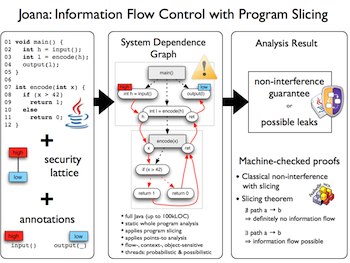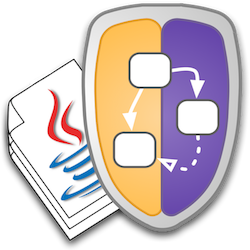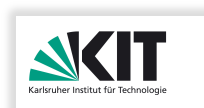|
JOANA analyses Java programs for security leaks (Information Flow Control, IFC). It guarantees to find all
violations of integrity or confidentiality – that is, all leaks which result from
illegal information flow within a program. JOANA analyses up to 100kLOC of
full Java with arbitrary threads (without reflection).
JOANA is one of the few internationally available
tools which can handle full Java and guarantees to find all leaks inside programs. JOANA thus
complements other techniques such as access control, certificates, or intrusion detection.
|
|
Technology
JOANA is based on a stack of sophisticated program analysis techniques, such as
pointer analysis, exception analysis, and program dependence graphs. Technically, these techniques are flow-sensitive, context-sensitive, object-sensitive, and lock-sensitive, which means
that JOANA minimizes false alarms. JOANA includes a new “RLSOD” algorithm for finding
all probabilistic leaks; these malicious leaks result from subtle interactions between threads
and interleaving. JOANA comes with a machine-checked soundness proof.
JOANA is open source, needs few program annotations and comes as Eclipse plug-in, providing a nice GUI.
Further reading
An overview of JOANA can be found in
Checking Probabilistic Noninterference Using JOANA,
a practical guide can be found in
Using JOANA for Information FlowControl in Java Programs, while
X-Rays,not Passport checks - Information Flow Control using JOANA
provides an overview presentation.
In-depth technical descriptions can be found in the articles
Flow-Sensitive, Context-Sensitive, and Object-sensitive Information Flow Control Based on Program Dependence Graphs
and
A New Algorithm for Low-Deterministic Security.
Work on JOANA has been partly supported by the DFG-funded SPP 1496
"Reliably Secure Software Systems – RS3" and
the BMBF-funded competence center for applied IT security technology
KASTEL.
JOANA builds upon the WALA program analysis framework.
Information flow control for Java in a nutshell

Information flow control is concerned with the security of information inside a program. It covers
confidentiality as well as integrity. Confidentiality
describes the property that sensitive information, like passwords or personal data, is not
leaked to public visible channels. Integrity, the dual property to confidentiality, guarantees that untrusted
input is not able to alter sensitive data or influence critical computations inside the
program.
JOANA is a framework that allows to statically analyze a given Java program for integrity
and confidentiality. Therefore the user has to provide annotations describing which parts of the
program correspond to sensitive (high) information, e.g. a variable storing a password, and where
untrusted (low) input or output occurs, e.g. calls to readln or println. The user
can also specifiy declassification annotations, when the security level of certain information needs to
be lowered. E.g. when a password is encrypted, it technically contains the same information as the
unencrypted value, but it does not require the same amount of caution.
|
JOANA builds a system dependence graph (SDG) from the program source. This graph is an
overapproximation
of the information flow inside the program. It contains nodes for each statement (resp. expression) and
edges between them iff the outcome of one statement depends on the execution of the other.
These dependencies do not only cover
direct dependencies through values, known as data dependencies; they also cover
indirect dependencies, called control dependencies. Control dependencies arise when
the outcome of a statement decides if another statement is executed, for example the condition of an
if-clause decides which statement is executed next. JOANA is based on a machine-checked proof that any
information flow is only possible along realizable paths in the SDG.
JOANA analyzes the information flow inside the program through graph based analyses, like
slicing and chopping, on the system dependence graph. If no path inside the SDG is found that
corresponds to illegal flow, the program is guaranteed to be secure. On the other hand if a violating
path exists, it may be a real security leak, but in some cases it could also be a false alarm that stems from an
overapproximation in the analysis.
Features of JOANA
- Support for full Java 7 bytecode (excluding Reflection), works on Java 8 JVMs.
- Minimize false alarms through precise object-, flow-, context- and field-sensitive program analysis techiques.
- Analysis of multithreaded programs: Detect possibilistic and probabilistic leaks.
- Minimal user interaction required: Automated propagation of security labels, only few annotations needed.
- Declassification: The user can specify points in the program where the security level of information should be lowered.
Obtaining Joana
Joana can be used with the following applications
The annotations used by Joana can be found at
Maven Central.
JOANA Source Code

Bug Tracker
In case you find some bugs in our tools, feel free to report them to us through the GitHub bug tracker.
Keep in mind that our programs are research prototypes, so please be forgiving.
Contact
Please contact Simon Bischof <simon.bischof@kit.edu> for further information
about this project.
Research Cooperation
JOANA is used in research projects outside of the programming paradigms group. We cooperate with the following projects and research groups:
Related Projects
Joana has been developed as part of the projects:
Visit these projects sites for further information about publications and technical details.
Veröffentlichungen
| 2022 |
|
M. Hecker, S. Bischof, G. Snelting:
On Time-Sensitive Control Dependencies.
TOPLAS 2022 |
| 2020 |
|
F. D. Loch, M. Johns, M. Hecker, M. Mohr, G. Snelting:
Hybrid Taint Analysis for Java EE.
SAC 2020 |
| 2018 |
|
S. Bischof, J. Breitner, D. Lohner, G. Snelting:
Illi Isabellistes Se Custodes Egregios Praestabant.
|
|
S. Bischof, J. Breitner, J. Graf, M. Hecker, M. Mohr, G. Snelting:
Low-Deterministic Security For Low-Nondeterministic Programs.
JCS |
|
B. Beckert, S. Bischof, M. Herda, M. Kirsten, M. K. Büning:
Using Theorem Provers to Increase the Precision of Dependence Analysis
for Information Flow Control.
ICFEM 2018 |
| 2017 |
|
B. Beckert, S. Bischof, M. Herda, M. Kirsten, M. K. Büning:
Combining Graph-Based and Deduction-Based Information-Flow Analysis.
HOTSPOT 2017 |
| 2016 |
|
J. Graf:
Information Flow Control with System Dependence Graphs -- Improving Modularity, Scalability and Precision for Object Oriented Languages.
|
|
M. Wiesner:
Intent-Analyse von Android-Applikationen.
|
|
J. Breitner, J. Graf, M. Hecker, M. Mohr, G. Snelting:
On Improvements Of Low-Deterministic Security.
POST 16 |
|
J. Graf, M. Hecker, M. Mohr, G. Snelting:
Sicherheitsanalyse mit JOANA.
Sicherheit 2016 |
|
J. Graf, M. Hecker, M. Mohr, G. Snelting:
Tool Demonstration: JOANA.
POST 16 |
| 2015 |
|
R. Küsters, T. Truderung, B. Beckert, D. Bruns, M. Kirsten, M. Mohr:
A Hybrid Approach for Proving Noninterference of Java Programs.
CSF 2015 |
|
J. Graf, M. Hecker, M. Mohr, G. Snelting:
Checking Applications using Security APIs with JOANA.
ASA 2015 |
|
G. Snelting:
Understanding Probabilistic Software Leaks.
SCP 2015 |
|
D. Giffhorn, G. Snelting:
A new algorithm for low-deterministic security.
IJIS |
|
M. Mohr, J. Graf, M. Hecker:
JoDroid: Adding Android Support to a Static Information Flow Control Tool.
|
|
E. Lovat, A. Fromm, M. Mohr, A. Pretschner:
SHRIFT System-Wide HybRid Information Flow Tracking.
IFIPSec 2015 |
| 2014 |
|
G. Snelting, D. Giffhorn, J. Graf, C. Hammer, M. Hecker, M. Mohr, D. Wasserrab:
Checking Probabilistic Noninterference Using JOANA.
IT 2014 |
|
R. Küsters, E. Scapin, T. Truderung, J. Graf:
Extending and Applying a Framework for the Cryptographic Verification of Java Programs.
POST 14 |
|
R. Küsters, E. Scapin, T. Truderung, J. Graf:
(accompanying technical report) Extending and Applying a Framework for the Cryptographic Verification of Java Programs..
|
| 2013 |
|
R. Küsters, T. Truderung, B. Beckert, D. Bruns, J. Graf, C. Scheben:
A Hybrid Approach for Proving Noninterference and Applications to the Cryptographic Verification of Java Programs.
GRSRD 2013 |
|
J. Graf, M. Hecker, M. Mohr:
Using JOANA for Information Flow Control in Java Programs - A Practical Guide.
ATPS 2013 |
|
J. Graf, M. Hecker, M. Mohr, B. Nordhoff:
Lock-sensitive Interference Analysis for Java: Combining Program Dependence Graphs with Dynamic Pushdown Networks.
ID 2013 |
| 2012 |
|
R. Küsters, T. Truderung, J. Graf:
A Framework for the Cryptographic Verification of Java-like Programs.
CSF 2012 |
|
D. Giffhorn, G. Snelting:
Probabilistic Noninterference Based on Program Dependence Graphs.
|
|
R. Küsters, T. Truderung, J. Graf:
(accompanying technical report) A Framework for the Cryptographic Verification of Java-like Programs.
|
|
D. Giffhorn:
Slicing of Concurrent Programs and its Application to Information Flow Control.
|
|
J. Graf, M. Hecker, M. Mohr:
Using JOANA for Information Flow Control in Java Programs - A Practical Guide.
|
| 2011 |
|
D. Giffhorn:
Advanced chopping of sequential and concurrent programs.
SQJ |
| 2010 |
|
M. Taghdiri, G. Snelting, C. Sinz:
Information Flow Analysis via Path Condition Refinement.
FAST 2010 |
|
J. Graf:
Speeding up context-, object- and field-sensitive SDG generation.
SCAM 2010 |
|
B. Katz, M. Krug, A. Lochbihler, I. Rutter, G. Snelting, D. Wagner:
Gateway Decompositions for Constrained Reachability Problems.
SEA 2010 |
|
C. Hammer:
Experiences with PDG-based IFC.
ESSoS'10 |
| 2009 |
|
C. Hammer, G. Snelting:
Flow-Sensitive, Context-Sensitive, and Object-sensitive Information
Flow Control Based on Program Dependence Graphs.
IJIS |
|
D. Giffhorn:
Chopping Concurrent Programs.
SCAM 2009 |
|
C. Hammer:
Information Flow Control for Java - A Comprehensive Approach based
on Path Conditions in Dependence Graphs.
Ph.D. thesis |
|
A. Lochbihler, G. Snelting:
On Temporal Path Conditions in Dependence Graphs.
JASE |
|
D. Giffhorn, C. Hammer:
Precise Slicing of Concurrent Programs - An Evaluation of Static
Slicing Algorithms for Concurrent Programs.
JASE |
|
J. Graf:
Improving and Evaluating the Scalability of Precise System Dependence
Graphs for Objectoriented Languages.
|
| 2008 |
|
C. Hammer, G. Snelting:
Flow-Sensitive, Context-Sensitive, and Object-sensitive Information
Flow Control Based on Program Dependence Graphs.
|
|
D. Giffhorn, C. Hammer:
Precise Analysis of Java Programs using JOANA (Tool Demonstration).
SCAM 2008 |
|
C. Hammer, R. Schaade, G. Snelting:
Static Path Conditions for Java.
PLAS 2008 |
| 2007 |
|
D. Giffhorn, C. Hammer:
An Evaluation of Slicing Algorithms for Concurrent Programs.
SCAM 2007 |
|
A. Lochbihler, G. Snelting:
On Temporal Path Conditions in Dependence Graphs.
SCAM 2007 |
| 2006 |
|
C. Hammer, J. Krinke, F. Nodes:
Intransitive Noninterference in Dependence Graphs.
ISoLA 2006 |
|
G. Snelting, T. Robschink, J. Krinke:
Efficient Path Conditions in Dependence Graphs for Software Safety
Analysis.
TOSEM 2006 |
|
C. Hammer, J. Krinke, G. Snelting:
Information Flow Control for Java Based on Path Conditions in Dependence
Graphs.
ISSSE 2006 |
|
C. Hammer, M. Grimme, J. Krinke:
Dynamic Path Conditions in Dependence Graphs.
PEPM 2006 |
| 2005 |
|
C. Hammer:
Parallelitätsanlayse für Slicing von Java Threads.
WSR 2005 |
|
G. Snelting:
Quantifier Elimination and Information Flow Control for Software
Security.
A3L 2005 |
|
T. Robschink:
Pfadbedingungen in Abhängigkeitsgraphen und ihre Anwendung in der
Softwaresicherheitstechnik.
|
| 2004 |
|
C. Hammer, G. Snelting:
An Improved Slicer for Java.
PASTE 2004 |
| 2003 |
|
J. Krinke:
Barrier Slicing and Chopping.
SCAM 2003 |
|
J. Krinke:
Context-Sensitive Slicing of Concurrent Programs.
FSE 2003 |
|
J. Krinke:
Advanced Slicing of Sequential and Concurrent Programs.
|
| 2002 |
|
J. Krinke:
Evaluating Context-Sensitive Slicing and Chopping.
ICSM 2002 |
|
T. Robschink, G. Snelting:
Efficient Path Conditions in Dependence Graphs.
ICSE 2002 |
| 1999 |
|
J. Krinke, T. Robschink, G. Snelting:
Software-Sicherheitsprüfung mit VALSOFT.
IFE 1999 |
| 1998 |
|
J. Krinke, G. Snelting:
Validation of Measurement Software as an Application of Slicing and
Constraint Solving.
IST 1998 |
|
J. Krinke:
Static Slicing of Threaded Programs.
PASTE 1998 |
|
J. Krinke, G. Snelting, T. Robschink:
Software-Sicherheitsprüfung mit VALSOFT.
ST 1998 |
| 1996 |
|
G. Snelting:
Combining Slicing and Constraint Solving for Validation of Measurement
Software.
SAS 1996 |




